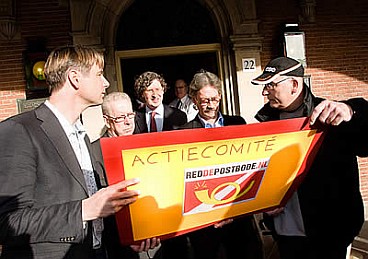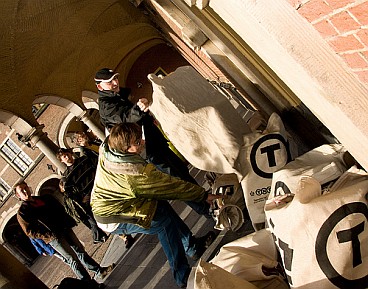Labour Party to play key role in EU-driven liberalisation of postal sector
Labour Party to play key role in EU-driven liberalisation of postal sector
“I can't believe that the Labour Party is going to vote in favour of the liberalisation of the postal market and thus ensure that 26,000 employees will suffer a wage cut of 15%.” With this challenging remark SP Senator Tuur Elzinga opened his contribution to the debate on the new postal law, which will be voted on next week. To reach the Chamber prior to the debate, Senators had to pass demonstrators from 'Red de Postbode' (“Save the Post(wo)man”) at the entrance to the building.

Last year saw Senator Elzinga's initiative to block consideration of the postal law win the support of a majority of the Chamber, despite the law having been accepted by the lower house in June 2007. Labour Party Secretary of State Frank Heemskerk's plans to transpose the EU's neoliberal directive completely liberalising the postal sector was derailed. But now, after almost a year's further delay, the proposal has returned to the agenda. Heemskerk's argument is that now that more EU member states have opened their postal markets to competition, a 'level playing field' has been created and TNT, the currently part-state-owned Dutch carrier, could be in a position to make bids for postal services in other countries. It is already understood to be attempting to buy a stake in Britain's Royal Mail, the sale of which is provoking huge controversy and resistance in the UK.
The Secretary of State also notes that employers and unions have reached an agreement on wages and working conditions. What he doesn't say, however, is how that agreement was arrived at. With the postal workers who had been admitted to the public gallery nodding in agreement, Senator Elzinga pointed out that the unions' negotiators had been forced into a corner and given a choice between large-scale compulsory redundancies on the one hand and a pay cut combined with a worsening of working conditions on the other. Not only that, but the agreement has still to be put to the unions' membership, and activists are campaigning had against it.
Elzinga also questioned the Secretary of State's claim that more countries have opened their postal sectors to competition. “It's actually only happened in Sweden,” he pointed out. “The former state enterprise was privatised, and now it makes a loss, sub post offices have been closed and the price of stamps is 30-70% higher than elsewhere in Europe. Is this what's in store for us?”

Germany and the UK are the only other countries which are attempting to throw open their postal markets, but it's far from certain whether they will succeed in forcing through the provisions of the EU directive. “In the meantime,” Elzinga said, “we have newcomers to the Dutch market which want to get a foothold here by driving down working conditions.”
For the umpteenth time, Elzinga asked the Secretary of State what on Earth he thought he would achieve by pushing this law through. “It's hard to imagine that we are going to see improvements in efficiency if we're soon going to have three different people delivering mail in the same street, and at the same time all of the post offices have been closed down.”
Next week's vote will hang in the balance, with Labour having what amounts to a casting vote. Whether this will turn out to be a good or bad thing, time will tell.

